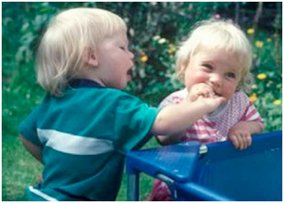 Toddlers are so adorable – little angels to the eyes of many. But they can be little monsters just the same when they start to bite. Their feeding bottle’s nipple, cot, toys, furniture, anything and anyone that would get their fancy. Ouch!! It certainly is a crucial concern but there’s no need to push the panic button. For many reasons, this is a common behavior amongst these cute little biters. Observe your toddler every now and then, so you’ll be aware when he will strike and why he bites all of a sudden. With this, you will understand him more and help your child change this behavior with different techniques.
Toddlers are so adorable – little angels to the eyes of many. But they can be little monsters just the same when they start to bite. Their feeding bottle’s nipple, cot, toys, furniture, anything and anyone that would get their fancy. Ouch!! It certainly is a crucial concern but there’s no need to push the panic button. For many reasons, this is a common behavior amongst these cute little biters. Observe your toddler every now and then, so you’ll be aware when he will strike and why he bites all of a sudden. With this, you will understand him more and help your child change this behavior with different techniques.
Child experts have listed reasons why toddlers love to bite. Generally, it is how they express themselves. The ever-curious child loves to experiment, they want to discover how their body works and are always putting things in their mouths. Thus, biting often happens. When they get over-excited, they simply bite, not understanding that the action is painful.
Biting is a way for toddlers to express their positive emotions. It is also their way to show defense and negative emotions like frustration and anger. If they want to get your attention – they bite, especially when they realize that it is an effective means for them attract attention.

Save yourself from the biting pain, and the embarrassment when your child bites another child. Try to solve the problem by these simple methods. All you need is to be consistent. Observe which will be the most effective way to help your child eventually stop his biting mania.
1. Divert your child’s attention from what is happening when you notice him gnashing his teeth. Bring him to a more quiet and calm place. Teeth clenching is a recognizable sign that the toddler is about to bite.
2. Gently explain to him that biting is not a good thing to do because it hurts others. Just give a firm “NO”.
3. Show your child how to express his feelings in a proper way. Teach him that hugging is the way to express love and instead of showing anger through biting, teach him to go to you.
4. Help your child not to bite when trying to get attention. Talk to him, but dont’t go further by giving your reasons. A firm “NO” is enough. Position yourself between facing the victim and your back to biter. This will give the victim sympathy and the biter a clear message that this is not an appropriate way to gain attention.
5. Be generous with praise when your toddler is behaving well. When he is not biting others and playing well in groups, give him a reassuring smile.
6. It’s not a healthy and effective way to bite your child back. It will only give them the idea that retaliation and revenge is okay. Forget what others tell you about biting back, it is not only immature it also gives your child the wrong message.






